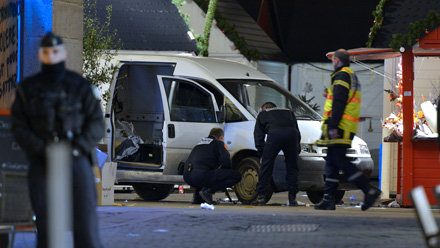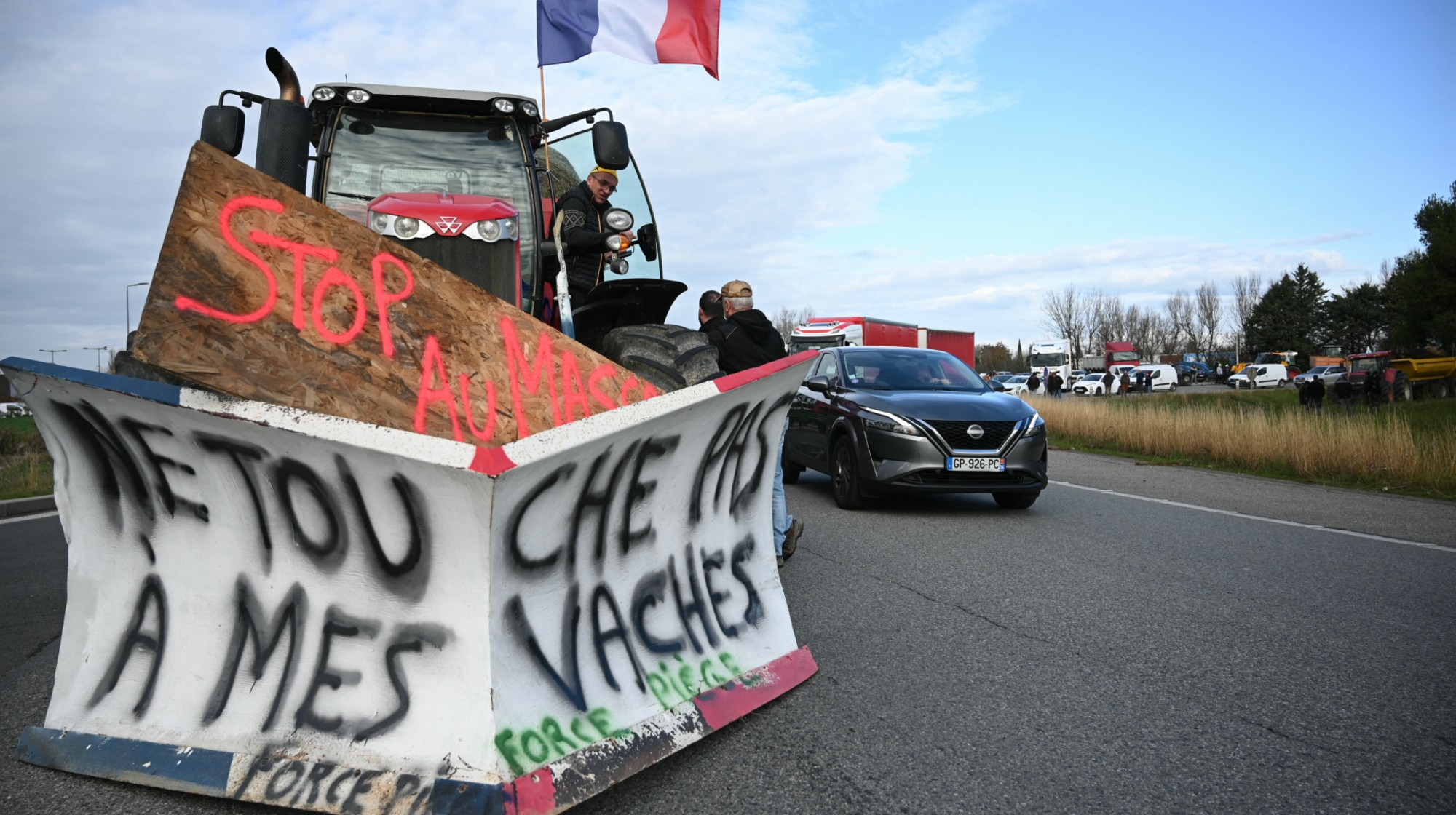French president urges calm after third attack in three days
11 people were injured last night when a driver rammed his van into a Christmas market in Nantes

A free daily email with the biggest news stories of the day – and the best features from TheWeek.com
You are now subscribed
Your newsletter sign-up was successful
A man drove his van into a busy Christmas market in Nantes last night, injuring 11 people before stabbing himself with a knife in a failed suicide attempt. Some reports suggest that he shouted "Allahu Akbar" ("God is great") as he ploughed into the crowd.
It was the third attack in three days, and came shortly after President Francoise Hollande urged the nation not to panic in the wake of the previous two incident.
Prime Minister Manuel Valls called for "cool-headedness" in response to the incidents.
The Week
Escape your echo chamber. Get the facts behind the news, plus analysis from multiple perspectives.

Sign up for The Week's Free Newsletters
From our morning news briefing to a weekly Good News Newsletter, get the best of The Week delivered directly to your inbox.
From our morning news briefing to a weekly Good News Newsletter, get the best of The Week delivered directly to your inbox.
What has happened?
The attacks began on Saturday when Bertrand Nzohabonayo, 20, from Burundi, entered a police station in Tours, central France, and stabbed two officers before being shot dead. Nzohabonayo had posted the black flag of Islamic State on his Facebook page, The Times reports.
On Sunday, a 40-year-old man drove his Renault Clio into pedestrians strolling in Dijon, injuring 13 people. Witnesses said that he shouted "Allahu Akhbar" and said that he was "acting for the children of Palestine" as he targeted pedestrians in five separate areas.
Witnesses in Nantes, including a police officer, said the perpetrator of last night's attack also shouted "Allahu Akbar".
A free daily email with the biggest news stories of the day – and the best features from TheWeek.com
However, Brigitte Lamy, a local prosecutor, denied that any slogan had been shouted during the attack. She said the driver was "a 37-year-old man born in the western French city of Saintes, about 150 miles south of Nantes", Fox News reports.
Police described the man as European, and said he was in hospital in a serious condition.
Are the attacks connected?
French authorities have said that there appears to be no relationship between the three attacks, the BBC reports. Prosecutors have also refused to say that the incident in Nantes was religiously motivated.
Lamy described the Nantes attack as an "isolated incident" with no relationship to the events on the weekend. "As things stand, we have no account pointing to any religious demands," she said.
Stephane Le Foll, the government spokesman, said that Hollande warned the public not to draw any parallels between the three attacks. "The president calls for solidarity with the victims. He also emphasised that we should not give in to panic," he said.
Does everyone agree?
Marine Le Pen, leader of the far-right National Front party, said that the president was "in denial" over the potential threat posed by religious extremism. Le Pen said that it was absurd to say "that Allahu akbar has nothing to do with religion". She added: "They are doing the maximum to minimise the facts."
However, in a press conference, prosecutor Marie-Christine Tarrare was very firm that the Dijon attack, at least, was "absolutely not an act of terrorism," so it was important not to draw connections between the three incidents. Tarrare added that the Dijon attacker had a "long-lasting and severe psychological disorder" and had been hospitalised more than 150 times since 2002.
What happens next?
Police are currently investigating a new French-language Islamic State video, which was released on YouTube last week. The video calls for Muslims to murder state officials. "If you cannot manage to procure a gun, there are stones, knives," the video says.
French authorities have prevented five terrorist plots acts so far this year, the police have said, but the government is concerned about the radicalisation of French nationals, the Daily Telegraph reports.
Prime Minister Valls warned: "Never have we known such a grave danger from terrorism. What worries us is the phenomena of very quick, deep radicalisation," he said, noting that around 1,000 French nationals have left the country in recent years to fight jihad in Syria and Iraq.
-
 Heated Rivalry, Bridgerton and why sex still sells on TV
Heated Rivalry, Bridgerton and why sex still sells on TVTalking Point Gen Z – often stereotyped as prudish and puritanical – are attracted to authenticity
-
 Sean Bean brings ‘charisma’ and warmth to Get Birding
Sean Bean brings ‘charisma’ and warmth to Get BirdingThe Week Recommends Surprise new host of RSPB’s birdwatching podcast is a hit
-
 Film reviews: ‘Send Help’ and ‘Private Life’
Film reviews: ‘Send Help’ and ‘Private Life’Feature An office doormat is stranded alone with her awful boss and a frazzled therapist turns amateur murder investigator
-
 Israel retrieves final hostage’s body from Gaza
Israel retrieves final hostage’s body from GazaSpeed Read The 24-year-old police officer was killed during the initial Hamas attack
-
 China’s Xi targets top general in growing purge
China’s Xi targets top general in growing purgeSpeed Read Zhang Youxia is being investigated over ‘grave violations’ of the law
-
 Panama and Canada are negotiating over a crucial copper mine
Panama and Canada are negotiating over a crucial copper mineIn the Spotlight Panama is set to make a final decision on the mine this summer
-
 Why Greenland’s natural resources are nearly impossible to mine
Why Greenland’s natural resources are nearly impossible to mineThe Explainer The country’s natural landscape makes the task extremely difficult
-
 Iran cuts internet as protests escalate
Iran cuts internet as protests escalateSpeed Reada Government buildings across the country have been set on fire
-
 US nabs ‘shadow’ tanker claimed by Russia
US nabs ‘shadow’ tanker claimed by RussiaSpeed Read The ship was one of two vessels seized by the US military
-
 ‘Lumpy skin’ protests intensify across France as farmers fight cull
‘Lumpy skin’ protests intensify across France as farmers fight cullIN THE SPOTLIGHT A bovine outbreak coupled with ongoing governmental frustrations is causing major problems for French civil society
-
 How Bulgaria’s government fell amid mass protests
How Bulgaria’s government fell amid mass protestsThe Explainer The country’s prime minister resigned as part of the fallout